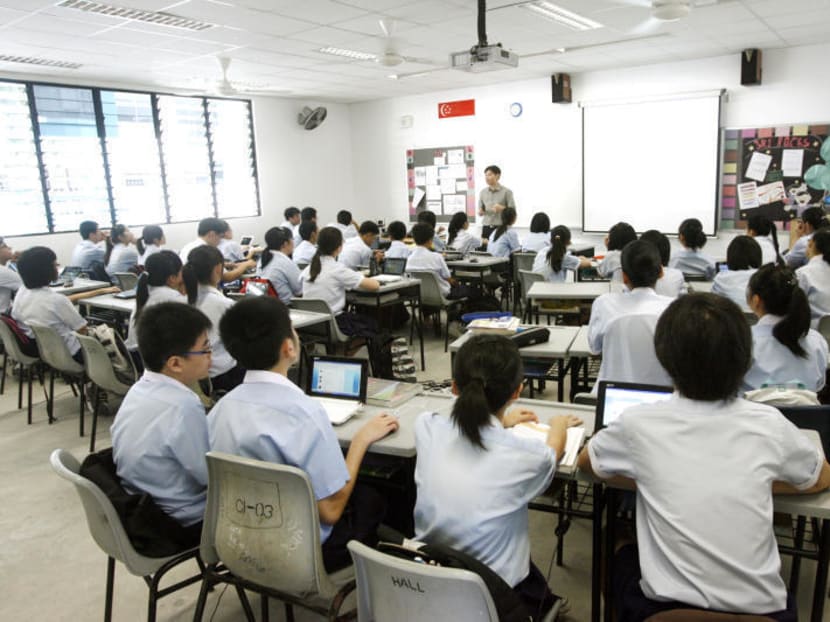Change at MOE ‘shows emphasis on learning beyond the classroom’
SINGAPORE — The delineation of duties in the Ministry of Education (MOE) in the latest round of Cabinet changes clearly signals the focus on acquiring skills beyond academic knowledge, educators and observers interviewed said today (Sept 29). And what also needs to be done is involving the larger community to shift mindsets about the value of learning beyond just earning good grades.
SINGAPORE — The delineation of duties in the Ministry of Education (MOE) in the latest round of Cabinet changes clearly signals the focus on acquiring skills beyond academic knowledge, educators and observers interviewed said today (Sept 29). And what also needs to be done is involving the larger community to shift mindsets about the value of learning beyond just earning good grades.
The latest Cabinet line-up, which takes effect on Thursday, sees two Acting Ministers appointed to head the MOE: Mr Ong Ye Kung, who will be in charge of skills and higher education, and Mr Ng Chee Meng, who will be in charge of schools. Both are entering political office for the first time.
Tampines Secondary School principal Balamurugan Krishnasamy said having a minister looking at skills signals its importance and the need to create industry networks “at the upstream higher-education level”.
Education has also become more complex, going outside of schools to involve the community, parents and businesses to guide the young. For example, at the recent annual MOE Workplan Seminar, a new network of established professionals — including scientists and artists — was set up for schools to tap for special programmes. It is logical to split the work between two ministers so that they can take a deeper look into each aspect as the scope and reach of work expands, said Mr Balamurugan.
Former Nominated Member of Parliament Kuik Shiao-Yin, who founded School of Thought, a social enterprise that offers General Paper tuition, agreed that the move is “a sign of how serious the Government is on moving into skills training”. She added: “It becomes very clear that learning does not end the moment you get out of school, but goes on for as long as you live.”
SIM University president Cheong Hee Kiat, noting that there have been worries over white-collar workers who face difficulty in securing jobs as economies evolve, said of the change: “It concentrates the mind on the need for work and tertiary education to be properly paired together, and not seen as separate aspects.”
At the schools’ level, educators said the momentum of de-emphasising grades and focusing on meaningful learning must continue.
Veteran educator and dean of Academy of Principals Belinda Charles said one priority at the schools’ level is to look at how examinations are being used. “So long as we have exams just for the sake of exams, the child (will) never truly learn in a way that keeps him a learning person for the rest of his life,” she said.
Mr Balamurugan urged the strengthening of career guidance in schools, and blurring the lines between education streams so that students can realise different aspirations. He added: “Education no longer exclusively belongs to schools ... increasingly, it has to involve the community and parents to provide for the holistic development of our youth.”
Observers also said that the two ministers must be in close communication, due to the interconnectivity of the entire education process.
Mrs Charles, for example, hoped to see more being done to broaden the scope of the university admission process, as it affects how schools prepare their pupils. Professor Cheong said attitudes towards work and learning should be inculcated during the early years of education, too. Although the ministry will be led by newcomers, Mrs Charles said the nature of MOE is that there is frequent interaction between the teachers and administrative officers. This will allow political office-holders to be kept informed of ground sentiments for new policy ideas, she said.
Retired Member of Parliament Inderjit Singh pointed out: “MOE is a key starting place for a key future minister, including the Prime Minister, so by putting two new faces in the ministry, the signal is that these two new ministers are slated for bigger posts in the future.”
When contacted, Mr Ong said in a statement: “The higher education landscape has evolved significantly over the years. There are now many more educational pathways to help uncover and realise the aspirations and passions of Singaporeans. I look forward to forging a close collaboration with all our IHL partners to further build upon our system.”
Outgoing Education Minister Heng Swee Keat wrote a letter to the staff of the ministry yesterday, thanking them for their efforts. “I leave MOE with the confidence that we have a great team of educators, professionals and officers at every level, and that PM Lee has chosen well in putting two very good men — Chee Meng and Ye Kung — in MOE.
He added: “I have every confidence that they will give their best, and will exercise leadership to take our education system to greater heights, to create opportunities for our children.”










